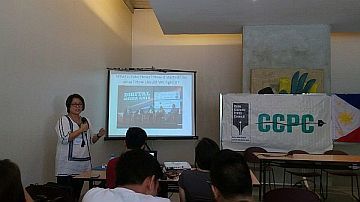
Mildred Galarpe, Online Sales Head of Sunstar Publishing, discusses concerns on fake news during the Cebu Citizens-Press Council meeting held at the Marcelo Fernan Press Center. (CDN PHOTO/ Doris Bongcac)
“IT’S no longer enough that we meet deadlines.”
Journalists should also be equipped to understand the use of technology to be able to compete with those that produce fake news, said Max Limpag, co-founder of InnoPub Media.
“What we need right now are journalists who are better prepared. It’s better to be technology literate kay ug dili, pildihon gyud ta aning mga tawhana (because if we aren’t, we will lose to these people),” he said.
Limpag was among those who spoke in a meeting at the Marcelo Fernan Press Center in Barangay Lahug, Thursday, regarding concerns on “The business of fake news”.
The issues were discussed by Cebu media leaders during the 46th quarterly meeting en banc of the Cebu Citizens-Press Council meeting held on Thursday.
Limpag said it was now a fact that mainstream media has lost information distribution to other platforms.
“Content technology is better understood by people who make money from fake news. Journalists are slow to adopt the system,” he noted.
“Content technology is evolving very rapidly,” Limpag added.
Members of the academe also found it necessary to include a curriculum that would teach not only Masscom and Journalism students but also information technology students the importance of media ethics.
For her part, Mildred Galarpe, Online Sales head of Sunstar Publishing Inc., noted that the proliferation of fake news started in 2007 with the start of the social media revolution.
Fake news are stories written for the purpose of disinformation for profits, political gains, crime, viral pranks and uncritical reporting of a hoax as fact.
“It’s meant to fool people for propaganda,” said Galarpe during her presentation.
Galarpe said that unlike in the past, fake news was now easier to produce because of its “zero cost” on social media sites.
Galarpe lamented that because of fake news, “trust on media is now plummeting.”
“We are losing it to the fake news websites,” she said.
Just like the manufacture of pirated DVDs and CDs that affects the local entertainment industry, Galarpe said the proliferation of fake news also affects the “brand”, which is the country’s media industry, and its consumers.
Constant exposure to fake news, Galarpe said, affects the readers’ thinking and decision-making.
Because of its growing popularity, websites that publish fake news are now beginning to get a big chunk of advertisements that should have gone to the mainstream media, she said.
But while fake news proliferate on social media sites, Galarpe noted that social media giants like Google and Facebook are now doing something to crackdown against online fraud.
Rappler, Galarpe said, also came up with some pointers on how to detect fake news which include the need to check the source of the story, reading beyond the headline and checking on the use of exaggerated language.
Galarpe said there is also a need to check if the story is backed by expert opinion.
Anol Mongaya, SunStar columnist and administrator of the FB page, “Maghisgot Kitag Politika Bay”, agreed on the need to teach members of the mainstream media and the public on the proper use of technology to especially detect fake news.
Disclaimer: The comments uploaded on this site do not necessarily represent or reflect the views of management and owner of Cebudailynews. We reserve the right to exclude comments that we deem to be inconsistent with our editorial standards.
